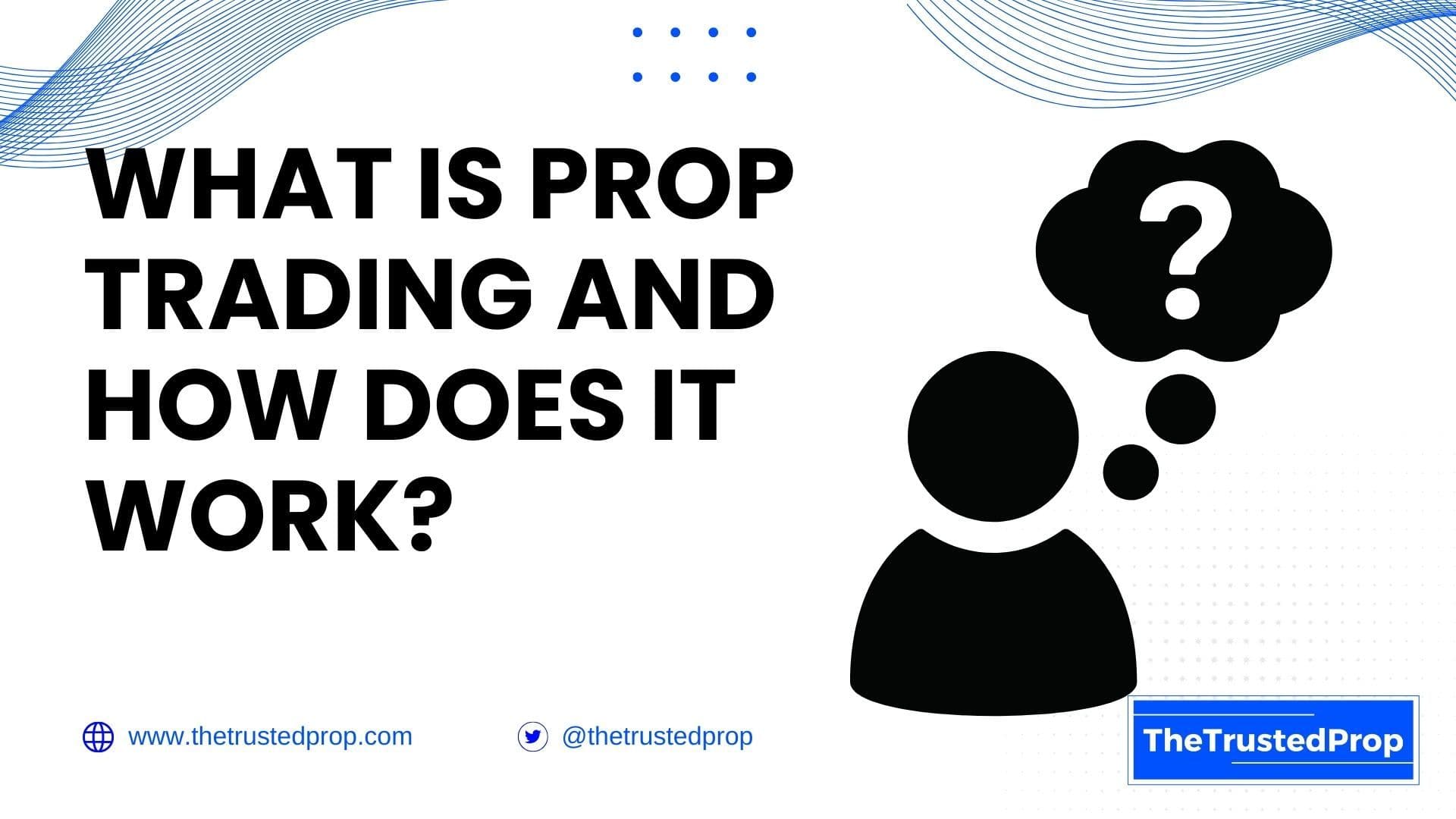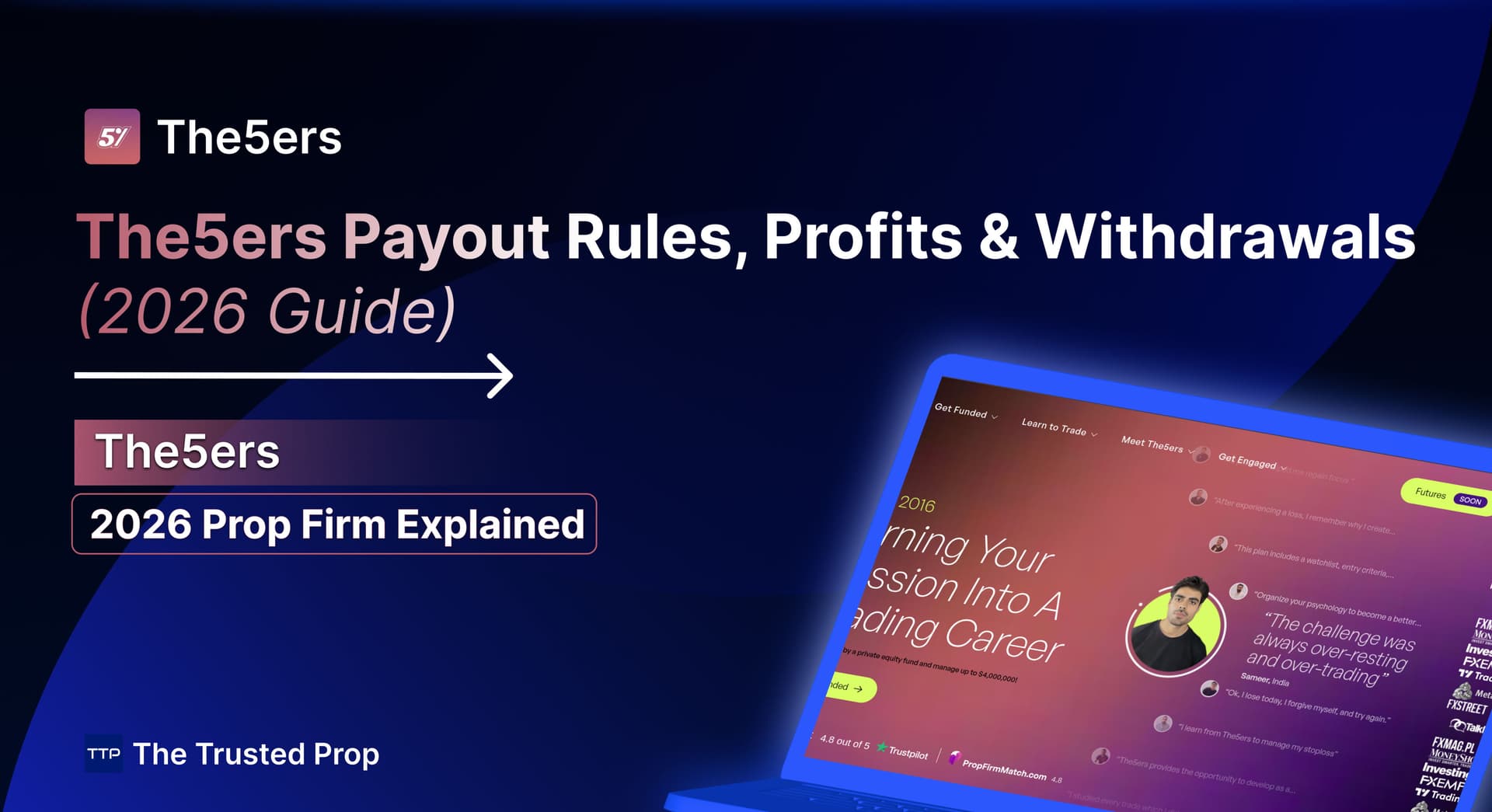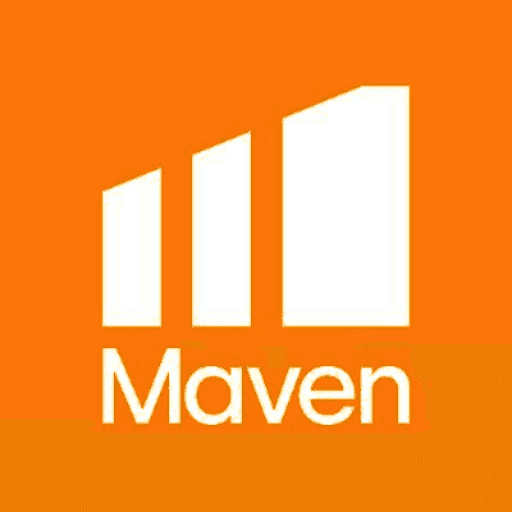What Is Prop Trading and How Does It Work?

What Is Prop Trading and How Does It Work?
8/9/2024
Prop trading, short for proprietary trading, is when financial companies trade stocks, bonds, and other financial products using their own money instead of client money. Unlike traditional trading where companies make money from commissions or fees, prop trading is all about making direct profits from the trades themselves.
Overview of the Prop Trading Market
The prop trading market is made up of firms that use their own capital to trade and try to make profits. These firms hire traders who have the skills to spot opportunities and make money. While the potential for profit is high, so are the risks, making this market suitable for experienced traders.
What is a Prop Trading Firm?
Definition of a Prop Trading Firm
A prop trading firm is a company that provides traders with money to trade. In return, the traders share a portion of the profits they make. These firms focus on trading with their own money to generate profits, rather than managing clients' investments like traditional investment banks or brokerages.
Key Functions of Prop Firms
Prop firms have several important jobs. They give traders the money they need to trade, manage risks to protect their capital, and make smart decisions based on market trends to maximize profits.
What is a Prop Trader?
Roles and Responsibilities of a Prop Trader
A prop trader is someone who trades using the firm’s money. Their main job is to make profits for the firm by buying and selling financial products. While they have the freedom to make their own trading decisions, they must follow the firm’s rules to manage risks.
Differences Between Prop Traders and Retail Traders
The big difference between prop traders and retail traders is whose money they use. Prop traders use the firm’s money, which allows them to take bigger risks and make bigger trades. Retail traders, on the other hand, use their own money, which often leads them to be more cautious.
How Does Prop Trading Work?
How Prop Firms Give Capital to Traders
When a trader joins a prop trading firm, the firm gives them a certain amount of money to trade with. The amount depends on how experienced the trader is and how confident the firm is in their abilities. As the trader proves their skill, they may receive more money to trade with, increasing their potential profits.
How Prop Firms Manage Risks
Prop firms are very careful about managing risks. They set strict rules on how much a trader can lose, use tools like stop-loss orders to minimize losses, and limit the size of trades. These measures help protect the firm’s money and keep traders from making risky decisions.
How Do Prop Firms Work?
How Prop Firms Operate
Prop firms operate by using their own money to trade and make profits. Unlike other financial firms that manage client money, prop firms take on all the risk and reward of their trading activities. This model allows them to keep more of the profits but also means they face higher risks.
How Prop Firms Make Money
Prop firms primarily make money through profit-sharing deals with their traders. For example, if a trader makes a profit, a portion goes to the trader, and the rest stays with the firm. Some firms also make money by charging fees for training, technology, or access to trading platforms, but this is less common.
How Do Prop Firms Make Money?
Profit Sharing Between Firms and Traders
Profit-sharing is the main way prop firms make money. They agree on a percentage of the profits that the trader gets to keep, with the rest going to the firm. The split can vary depending on the firm and the trader’s experience.
Other Ways Prop Firms Make Money
Some prop firms charge fees for things like joining their trading program, accessing their technology, or receiving training. However, these additional revenue streams are usually secondary to the money they make from trading profits.
Advantages of Prop Trading
Getting Access to More Money for Trading
One of the biggest benefits of prop trading is that traders get access to much more money than they would on their own. This allows them to make bigger trades and potentially earn more profits.
Freedom to Make Your Own Trading Decisions
Prop traders often have a lot of freedom to decide how they want to trade. As long as they follow the firm’s rules for managing risks, they can develop and execute their own trading strategies.
Learning from Other Experienced Traders
Working at a prop firm allows traders to learn from others who are skilled and experienced. They also get access to advanced tools and technology that can help them improve their trading skills.
Disadvantages of Prop Trading
High Pressure to Perform Well
Prop trading can be very stressful. Traders are under a lot of pressure to make profits, and if they don’t perform well, they may lose their capital allocation or even their job.
Job Instability if Performance is Low
Prop firms are known for having a competitive environment. If a trader doesn’t perform well, they might be quickly let go. This lack of job security can be difficult for some people.
Upfront Fees Some Firms May Charge
Some prop firms require traders to pay fees to join their program or pass a trading challenge before they get funding. These fees can be a barrier, especially for new traders.
How to Get Started with Prop Trading
Steps to Join a Prop Trading Firm
If you’re interested in prop trading, here’s how to get started:
- Research and Choose a Firm: Find a prop firm that fits your trading style and offers the support you need.
- Apply to the Firm: Submit an application that details your trading experience and strategies.
- Pass an Evaluation: Some firms require you to pass a trading challenge to prove your skills.
Start Trading: Once accepted, you’ll receive capital from the firm and can begin trading.
Skills You Need to Become a Prop Trader
To be a successful prop trader, you need strong analytical skills, a good understanding of financial markets, and the ability to manage risks. While having a background in finance can help, what really matters is your ability to consistently make profitable trades.
What is a Forex Proprietary Trading Firm?
Special Focus on Trading Currencies
Forex prop firms specialize in trading currencies. They provide traders with the capital to trade in the Forex market, which is known for its high liquidity and 24-hour trading. This type of trading is ideal for those who have experience in currency trading and are looking for the flexibility to trade at any time.
Pros and Cons of Forex Prop Trading
The benefits of Forex prop trading include access to significant capital and advanced trading platforms. However, the challenges include dealing with the volatility of the Forex market and managing the risks associated with currency fluctuations.
How Do Forex Prop Firms Work?
Differences Between Forex Prop Trading and Regular Forex Trading
In regular Forex trading, traders use their own money, and they bear all the risks. In Forex prop trading, the firm provides the capital, allowing traders to take larger positions. The firm also has risk management policies to help control potential losses.
Unique Aspects of Forex Prop Firms
Forex prop firms often offer specialized training and access to real-time market data. They may also provide expert advice and research, helping traders make better-informed decisions. These features make Forex prop trading an attractive option for those looking to grow their trading career.
How Do Prop Traders Make Money?
Ways Prop Traders Earn Money
Prop traders earn money through profit-sharing. They get to keep a portion of the profits they make from trading, while the rest goes to the firm. Some firms also offer bonuses or incentives for meeting certain performance goals.
Factors That Affect How Much Prop Traders Earn
Several factors can influence a prop trader’s earnings, such as their trading strategy, how well they manage risks, and the size of their capital allocation. Traders who consistently perform well and manage their risks are likely to earn more.
Selecting the Right Prop Firm
What to Look for in a Prop Firm
When choosing a prop firm, consider the firm’s reputation, the profit-sharing structure, and the support they offer. Look for a firm with a history of success and transparent policies. It’s also important to find out what kind of training and resources the firm provides.
Understanding Profit Sharing and Support from Firms
Profit-sharing structures can vary, so it’s important to understand how much of your profits you’ll keep versus how much the firm will take. Additionally, consider the level of support the firm offers, such as training and mentoring, which can be crucial for your success.
Legal and Regulatory Aspects of Prop Trading
Rules and Regulations Prop Firms Must Follow
Prop firms must comply with various legal and regulatory requirements, such as registering with financial authorities and maintaining minimum capital levels. They also need to implement anti-money laundering (AML) and know-your-customer (KYC) procedures to prevent illegal activities.
How Regulations Affect Prop Trading
Changes in regulations can have a big impact on prop trading. For example, stricter rules on trading practices or capital requirements can change how prop firms operate. It’s important for traders to stay informed about these regulations and choose firms that comply with all the necessary laws.
The Future of Prop Trading
New Trends in Prop Trading
Prop trading is constantly evolving, with new trends such as the use of artificial intelligence (AI) and machine learning in trading strategies. Remote trading is also becoming more popular, and there’s a growing interest in trading new financial instruments like cryptocurrencies.
How Technology is Shaping the Future of Prop Trading
Technology is playing a key role in the future of prop trading. Advanced trading platforms, real-time data, and algorithmic trading tools are becoming increasingly important. As technology continues to advance, it’s likely to create new opportunities and challenges in the world of prop trading.
Conclusion
Prop trading offers a unique opportunity for skilled traders to use firm capital and advanced tools to maximize their profits. While it’s a challenging field that requires a strong understanding of markets, the potential rewards can make it a great choice for those with the right skills and mindset. By choosing the right prop firm and staying focused, you can take your trading career to new heights.
You may also like
Goat Funded Futures Instant Account Explained 2026: Rules & Payouts

My Funded Futures Drawdown Rules Explained (2026 Guide)
.jpg&w=1920&q=75)
FTMO 1-Step Challenge Explained (2026): Rules & Payouts

The5ers Trading Rules & Risk Limits Explained (2026 Update)
.jpg&w=1920&q=75)
The5ers Payout Rules, Profits & Withdrawals (2026 Guide)

DNA Funded Detailed Review 2026: Our Honest Verdict
.jpg&w=1920&q=75)
Goat Funded Trader Instant Goat Account Explained (2026)
.jpg&w=1920&q=75)
No FAQs are available for this topic yet.






















